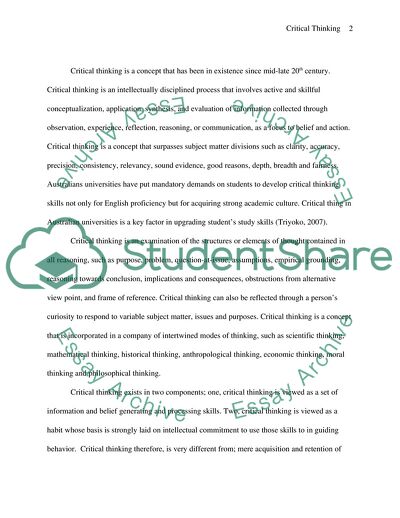
- Home
- Free Samples
- Premium Essays
- Editing Services
- Extra Tools
- Essay Writing Help
- About Us
- Studentshare
- Subjects
- Miscellaneous
- Critical thinking
Critical thinking - Essay Example

- Subject: Miscellaneous
- Type: Essay
- Level: Undergraduate
- Pages: 4 (1000 words)
- Downloads: 0
- Author: claredonnelly
Extract of sample "Critical thinking"
Australians universities have put mandatory demands on students to develop critical thinking skills not only for English proficiency but for acquiring strong academic culture. Critical thing in Australian universities is a key factor in upgrading student’s study skills (Triyoko, 2007). Critical thinking is an examination of the structures or elements of thought contained in all reasoning, such as purpose, problem, question-at-issue, assumptions, empirical grounding, reasoning towards conclusion, implications and consequences, obstructions from alternative view point, and frame of reference.
Critical thinking can also be reflected through a person’s curiosity to respond to variable subject matter, issues and purposes. Critical thinking is a concept that is incorporated in a company of intertwined modes of thinking, such as scientific thinking, mathematical thinking, historical thinking, anthropological thinking, economic thinking, moral thinking and philosophical thinking. Critical thinking exists in two components; one, critical thinking is viewed as a set of information and belief generating and processing skills.
Two, critical thinking is viewed as a habit whose basis is strongly laid on intellectual commitment to use those skills to in guiding behavior. Critical thinking therefore, is very different from; mere acquisition and retention of information, because critical thinking has a peculiar way of seeking, attaining and treating information. Again, critical thinking is different from sheer possession of a set of skills, because, critical thinking is only complete if it exercises use of those skills continuously (Scriven & Paul, 1987).
Critical thinking is not made a concept merely by acquiring skills and putting them into practice; it is fulfilled if the skills put into practice are observed to produce results which must be analyzed and accepted to be important into a certain body of knowledge. Critical thinking is governed by some specific motive
...Download file to see next pages Read MoreCHECK THESE SAMPLES OF Critical thinking
Dimensions of Critical Thinking
Critical Thinking Application Paper
Psychology: Critical Thinking
Encouraging Critical Thinking
Developing Critical Thinking
Critical Thinking Exposition
Critical Thinking and Ethics
Critical thinking and ethics

- TERMS & CONDITIONS
- PRIVACY POLICY
- COOKIES POLICY